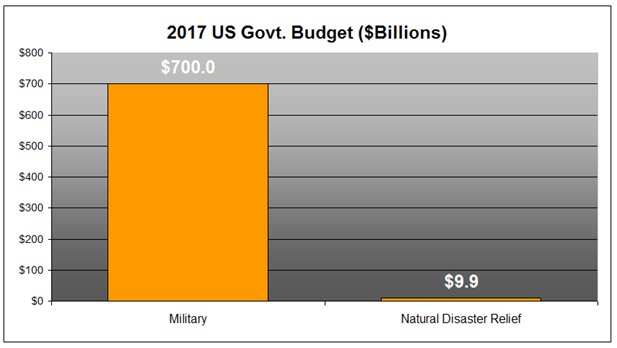Coming to the Rescue of the Victims of Natural Disasters: Spending for War vs. Natural Disaster Relief

I have an aunt who lives in paradise – Paradise, California, that is. But in 2017 it has been anything but, as the communities surrounding Paradise have been evacuated on two separate occasions due to natural disasters and crumbling infrastructure. In February, torrential downpours caused the Oroville Dam to fail, washing out homes, businesses, memories and lives. And now they are dealing with devastating wildfires that have killed dozens, displaced thousands, and are being fought by firefighters, some of whom are only making minimum wage and working 70 straight hours.
The fires in California are just the latest natural disaster to inflict suffering on Americans, as the people in Puerto Rico, Florida and Texas can attest, following massive hurricanes over the summer.
Nearly one month after being crushed by Hurricane Maria, 85% of Puerto Ricans still do not have electricity, and 40% do not have running water, and people from the Southwest and the Southeast US continue to struggle with the aftermath of Hurricanes Irma and Harvey.
The destructive California wildfires are predicted to cost the US economy $85 billion. The costs of recovery post-Hurricanes Harvey, Irma and Maria are estimated to be a minimum of $65 billion, $25 billion and $45 billion, respectively. The combined estimated cost of the recent natural disasters is $220 billion which is just a fraction of the $700 billion the US will spend on the military in 2017.
In fact, Congress appropriates more than 70 times the amount of money for the military as it does for the Federal Emergency Management Administration’s (FEMA)Disaster Relief Fund:
If the US allocated disaster relief funds to its own citizens as religiously as it allocated tax payer dollars to US wars abroad, everyone in affected areas could easily be provided the help they need to get back on their feet.
For example, instead of spending $1.25 trillion dollars to modernize the US nuclear arsenal, and $566 billion to build the Navy a 308-ship fleet, wouldn’t Americans prefer to have that money available to rebuild Southeast Texas, Florida, Puerto Rico and California?
Wouldn’t this military allocation be better utilized by modernizing our infrastructure, building more disaster relief centers, and hiring more firefighters and first responders? Or earmarked to groups like Team Rubicon, a veteran-led organization that trains disaster relief volunteers?
Instead of spending money on war, which leads to destruction, we should spend money in the US to help Americans whose lives are destroyed by natural disasters.
We can’t prevent natural disasters but we as a country can fund the improvement of infrastructure and services so that after a natural disaster hits, the outcome is less devastating to the American people.
Chris Ernesto is the webmaster and co-founder of St. Pete for Peace, a non-partisan antiwar organization providing peace oriented education events and services to the Tampa Bay, FL community since 2003.


